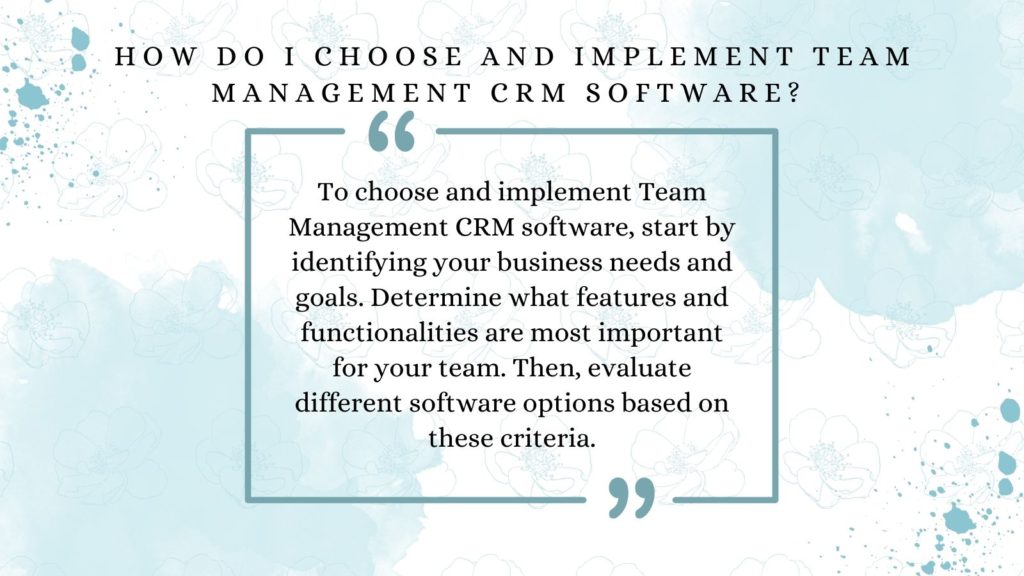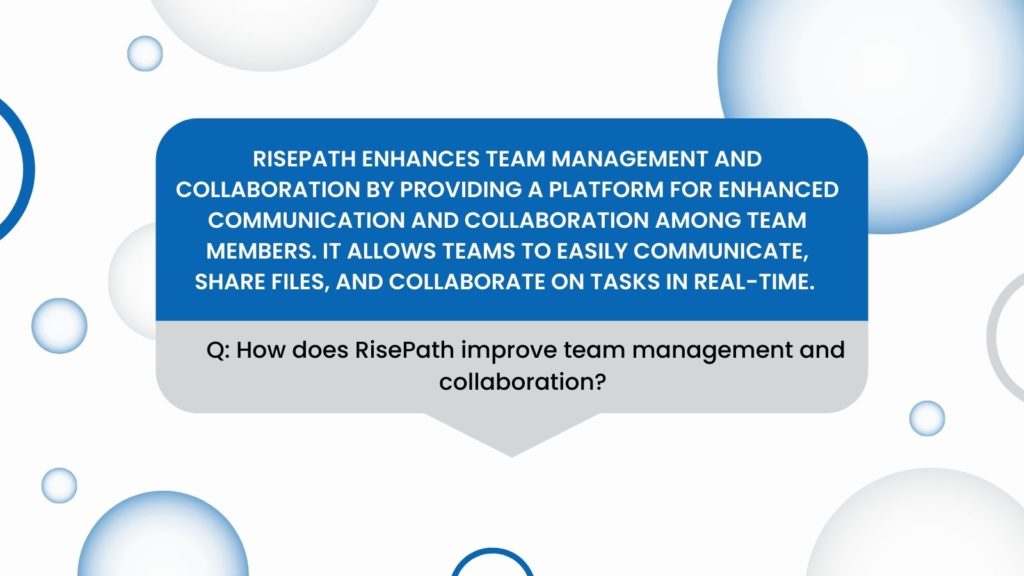Team management balance is crucial for the success of any organization. When a team is properly managed, it can lead to increased productivity, efficiency, and employee satisfaction. Additionally, a well-balanced team ensures that all members’ skills and strengths are utilized effectively, leading to better problem-solving and decision-making.
Without a proper balance in team management, conflicts and communication breakdowns can arise, hindering the team’s progress and overall success. Therefore, it is imperative for leaders to prioritize team management balance to achieve optimal results.
Achieving balance in team management can be challenging due to various factors. One common challenge is the diversity of team members, each with their own unique personalities, backgrounds, and communication styles. This can lead to misunderstandings and conflicts if not addressed effectively.
Another challenge is the ever-changing dynamics within a team, as new members join or existing members leave. Maintaining balance requires continuous assessment and adjustment to ensure that team roles and responsibilities are properly distributed and aligned with the team’s goals.
Additionally, time constraints and competing priorities can make it difficult for leaders to dedicate sufficient attention to team management, further hindering the achievement of balance.
Effective team management balance is crucial for a team’s success and productivity. When there is imbalance within a team, it can lead to poor communication, decreased motivation, and conflicts that can escalate if not addressed promptly.
The ever-changing dynamics within a team, such as new members joining or existing members leaving, can further disrupt the balance and require constant evaluation and adjustment.
Time constraints and competing priorities can also pose challenges for leaders, as they struggle to allocate sufficient attention to team management amidst other responsibilities, ultimately hindering the achievement of balance. However, when team management balance is achieved, it fosters a harmonious and efficient work environment, where individuals feel supported, motivated, and empowered to contribute their best.
Understanding Team Dynamics
Understanding team dynamics is crucial for effective team management. Each team member brings a unique personality and set of skills to the table, and it is important for leaders to recognize and appreciate these differences. Some individuals may be more extroverted and thrive in social settings, while others may be introverted and excel at independent tasks.
Additionally, team members may take on different roles within the team, such as being the mediator, the idea generator, or the problem solver. By understanding and leveraging these dynamics, leaders can create a cohesive and high-performing team that capitalizes on each member’s strengths.
The importance of understanding team
Understanding team members’ strengths and weaknesses is crucial for effective leadership. It allows leaders to assign tasks and responsibilities to individuals who are best suited for them, maximizing productivity and efficiency.
Moreover, by recognizing and appreciating these differences, leaders can foster a supportive and inclusive work environment where team members feel valued and empowered. This not only boosts morale but also promotes collaboration and innovation, as individuals can freely contribute their unique perspectives and skills to achieve common goals.
For example, in a marketing team, an extroverted team member may excel at networking and building relationships with clients, while an introverted team member may thrive in analyzing data and creating marketing strategies. The leader can recognize these strengths and assign tasks accordingly, resulting in a well-rounded and efficient team.
Moreover, understanding the different roles within the team can help the leader identify who is best suited to mediate conflicts, generate innovative ideas, or solve complex problems, leading to a harmonious and productive work
Strategies for fostering effective Communication
include establishing clear goals and expectations, providing regular feedback and constructive criticism, promoting open and honest communication, and encouraging active listening and empathy. Team building activities and trainings can also be implemented to enhance trust and camaraderie among team members.
Additionally, utilizing technology tools and platforms can facilitate seamless communication and collaboration, especially for remote or distributed teams. Ultimately, creating a culture of communication and collaboration is crucial for fostering a high-performing and cohesive team.
For example, a leader who understands that one team member excels in analytical thinking but struggles with public speaking can assign them tasks that utilize their strengths, such as data analysis and research, while providing support and training to improve their public speaking skills.
This not only allows the team member to contribute effectively but also helps them grow and develop in areas where they are weaker. By leveraging the diverse strengths and weaknesses of team members, leaders can create a well-rounded and high-performing team.
Setting Clear Expectations
Setting clear expectations is crucial in any team setting as it helps eliminate confusion and ensures everyone knows their specific roles and responsibilities. When team members have a clear understanding of what is expected of them, they can work more efficiently and effectively towards achieving their goals.
Additionally, clearly defined roles and responsibilities promote accountability and prevent any overlap or gaps in work. This not only boosts productivity but also fosters a positive and collaborative work environment where everyone feels valued and empowered.
Establishing clear goals and objectives for the team
Establishing clear goals and objectives for the team is also essential for success. When team members have a clear direction and purpose, they can align their efforts and focus on achieving the desired outcomes. Clear goals provide a roadmap for the team and allow individuals to prioritize their tasks accordingly.
Also Read: The Ultimate Guide to Keeping Your Remote Team Connected
Moreover, having well-defined objectives helps measure progress and celebrate milestones, which can boost motivation and engagement within the team. Ultimately, establishing clear goals and objectives creates a sense of purpose and unity, leading to a more productive and cohesive team dynamic.
Implementing regular performance evaluations and feedback sessions
Implementing regular performance evaluations and feedback sessions can further contribute to the team’s success. By evaluating individual and collective performance, team members can identify areas for improvement and make necessary adjustments to achieve their goals.
Additionally, feedback sessions allow for open communication and constructive criticism, fostering a culture of continuous learning and growth within the team. This constant feedback loop not only helps individuals stay on track but also strengthens the team’s overall performance and effectiveness.
Counterargument: Implementing regular performance evaluations and feedback sessions can create unnecessary pressure and competition within the team, leading to a decline in morale and collaboration.
Time Management and Delegation
Strategies for prioritizing tasks and managing time effectively include creating a detailed schedule, setting realistic deadlines, and delegating tasks to team members based on their strengths and capabilities. By effectively managing time and delegating responsibilities, teams can avoid burnout and ensure that all tasks are completed efficiently.
However, some may argue that relying too heavily on delegation can result in a lack of accountability and a decrease in individual ownership of tasks. It is important to strike a balance between delegation and individual responsibility to maintain productivity and teamwork within the team.
Discussion on the importance of delegating tasks to team members
One reason why delegating tasks to team members is important is that it allows for a more efficient use of resources. When tasks are distributed among team members based on their strengths and capabilities, it ensures that each person is working on something they are skilled at, resulting in higher quality work and faster completion times.
Additionally, delegating tasks helps to foster a sense of trust and confidence within the team. When team members are entrusted with specific responsibilities, it shows that their skills and abilities are valued, which can boost morale and motivation.
Also Read: 2023 RisePath the Top Scheduling project management tool
For example, in a software development team, the project manager can delegate the coding tasks to team members who have expertise in programming languages, while assigning the testing responsibilities to individuals with strong attention to detail.
This ensures that each task is handled by someone who is skilled in that specific area, leading to efficient completion of the project. However, if delegation is taken too far and team members are not held accountable for their assigned tasks, it can result in a lack of motivation and a decrease in overall productivity.
Ensuring that workload is distributed evenly
Ensuring that workload is distributed evenly among team members is also crucial to maintaining a productive and motivated team. By regularly assessing each team member’s capabilities and workload, the project manager can avoid overburdening certain individuals and ensure that everyone is contributing equally.
Additionally, open communication and regular check-ins can help identify any potential issues or bottlenecks in the delegation process, allowing for adjustments to be made and preventing any negative impacts on productivity.
Ensuring that workload is distributed evenly among team members can help prevent a situation where some team members are overwhelmed with tasks while others have very little to do, thus maintaining motivation and productivity levels.
Building Trust and Motivation
Building trust and motivation is essential for creating a positive and supportive team environment. When team members trust and support one another, they are more likely to collaborate effectively, share ideas, and take ownership of their work. This can lead to increased motivation and productivity as team members feel valued and empowered.
A positive team environment also fosters open communication, where feedback and ideas are freely exchanged, further enhancing trust and motivation within the team. Ultimately, a positive and supportive team environment is a breeding ground for innovation, creativity, and success.
Strategies for building trust and fostering open communication within the team
Strategies for building trust and fostering open communication within the teaminclude regular team-building exercises, creating opportunities for team members to get to know each other on a personal level, and encouraging open and honest communication. It is also important for leaders to lead by example and demonstrate trust and support towards their team members.
Providing regular feedback and recognition for individual and team achievements can also contribute to building trust and fostering open communication. Additionally, creating a safe and inclusive environment where all team members feel comfortable sharing their ideas and opinions is crucial for building trust and promoting effective collaboration.
Encouraging and recognizing team members’ achievements and contributions
Encouraging and recognizing team members’ achievements and contributions can boost their confidence and motivation, which in turn strengthens their commitment to the team and the organization. By acknowledging their hard work and successes, leaders show their appreciation and value for their team members’ efforts.
This not only builds trust but also encourages a positive and collaborative work culture where everyone feels valued and supported. Moreover, recognizing individual and team achievements fosters a sense of camaraderie and encourages team members to openly share their ideas and opinions, knowing that their contributions will be acknowledged and respected.
For example, a leader could regularly hold team meetings to acknowledge and celebrate individual and team accomplishments. This could involve highlighting specific achievements, such as meeting project deadlines or exceeding performance targets, and publicly recognizing the individuals responsible for these successes.
Additionally, leaders can encourage open communication by actively seeking input and feedback from team members during these meetings, creating a safe space for everyone to contribute their ideas and opinions.
Team Management CRM Tool like RisePath
RisePath is a comprehensive team management CRM tool designed to streamline project management, sales pipeline management, and customer relationship management. It provides a simple yet powerful solution for cross-team collaboration, enabling teams to work together more efficiently and effectively.
The software offers a message board and chat system integrated with projects, providing real-time updates to keep everyone informed on project activities. With RisePath, teams can manage tasks, track progress, and stay on top of deadlines, all while collaborating seamlessly.
RisePath’s features include task management, sales pipeline management, and customer relationship management[4]. Its task management tools allow teams to break down projects into smaller tasks, assign them to team members, and track progress.
Sales pipeline management tools enable teams to manage leads and opportunities, track deals, and forecast revenue. Customer relationship management tools help teams manage interactions with leads and customers, track customer data, and improve customer engagement. The software also seamlessly integrates with CRM systems and email marketing platforms, allowing for a streamlined workflow and centralized data.
Also Read: Asana Project Management Tool’s free alternative in 2023
Using RisePath for team management and collaboration offers several benefits. It enhances team collaboration by enabling real-time communication, file sharing, and feedback exchange. It also improves project visibility, allowing teams to monitor and manage projects more effectively. RisePath helps teams manage resources, set project goals, and coordinate tasks, streamlining communication and collaboration with stakeholders.
Additionally, it enhances sales management by streamlining sales processes, tracking deals, and forecasting revenue. By providing a comprehensive solution for team management and collaboration, RisePath can help teams work more efficiently and effectively, ultimately leading to improved productivity and success.
How RisePath improves Team Management and Collaboration
RisePath is a powerful team management CRM tool that enhances communication and collaboration among team members. It provides a centralized platform where team members can connect and communicate with each other seamlessly, regardless of their location.
With features like chat, comments, and notifications, RisePath enables real-time communication and collaboration, fostering a sense of teamwork and shared responsibility. This enhanced communication and collaboration can lead to improved team productivity, efficiency, and overall performance.
RisePath’s streamlined task management and delegation features allow team managers to assign tasks to team members, set deadlines, and track progress. This ensures that everyone is on the same page and working towards the same goals. With a clear understanding of their responsibilities and deadlines, team members can work more efficiently and effectively, reducing the risk of missed deadlines or incomplete tasks.
This streamlined approach to task management and delegation can improve team productivity, reduce stress, and enhance the overall quality of work.
RisePath’s CRM and sales pipeline management tools can significantly improve lead generation and sales performance. With features like lead tracking, pipeline management, and automated workflows, RisePath helps sales teams to streamline their sales processes, identify potential leads, and close more deals.
The integration of CRM and project management tools allows for seamless communication between sales and project teams, ensuring that everyone is working towards the same goals. This streamlined approach to sales pipeline management can lead to improved sales performance, increased revenue, and better customer relationships.
RisePath is a powerful team management CRM tool that can significantly improve team collaboration, task management, and sales performance. By providing a centralized platform for communication and collaboration, streamlining task management and delegation, and enhancing sales pipeline management and lead generation, RisePath can help teams to work more efficiently, effectively, and productively.
RisePath’s impact on Business Growth and Success
RisePath is a team management CRM tool that has a significant impact on the growth and success of businesses. One of the key benefits of using RisePath is the increased efficiency and productivity of sales teams.
With its easy-to-use interface, customizable dashboards, and automated workflows, RisePath streamlines sales management processes, allowing sales reps to focus on what they do best – selling. By reducing time spent on administrative tasks and minimizing errors, sales teams can close more deals in less time, leading to increased revenue and business growth.
Another way in which RisePath contributes to business growth and success is through improved customer relationship management and retention. With its advanced customer management features, including lead tracking, customer segmentation, and personalized communication tools,
RisePath enables businesses to build stronger relationships with their customers. By providing a more personalized and engaging customer experience, businesses can increase customer loyalty and retention, leading to a more stable and profitable customer base.
Finally, RisePath provides enhanced visibility into sales performance and business metrics. With its robust reporting and analytics capabilities, businesses can gain valuable insights into their sales pipeline, revenue forecasts, and customer behavior.
This data-driven approach to sales management allows businesses to make more informed decisions, optimize their sales processes, and ultimately drive growth and success. By leveraging the power of RisePath’s CRM tool, businesses can achieve their sales goals and take their operations to the next level[.
Faqs
Q: What is RisePath and what are its main features?
A: RisePath is a Team Management CRM Tool that offers various features to help teams collaborate and manage their tasks. Some of its main features include Task Management, Sales Pipeline Management, and Customer Relationship Management.
Q: How does RisePath improve team management and collaboration?
A: RisePath enhances team management and collaboration by providing a platform for enhanced communication and collaboration among team members. It allows teams to easily communicate, share files, and collaborate on tasks in real-time.
Additionally, RisePath streamlines task management and delegation, ensuring that team members stay organized and productive.
Q: How does RisePath impact business growth and success?
A: RisePath positively impacts business growth and success in several ways. Firstly, it increases the efficiency and productivity of sales teams by providing them with tools to manage their tasks and sales pipeline effectively.
Secondly, RisePath improves customer relationship management and retention by centralizing customer data and facilitating better interaction with customers. Lastly, RisePath offers enhanced visibility into sales performance and business metrics, allowing businesses to make informed decisions and identify areas for improvement.
Q: Is RisePath the number one CRM platform?
A: RisePath is a powerful Team Management CRM Tool, but it is not recognized as the number one CRM platform. The title of the number one CRM platform is typically attributed to Salesforce.com, a widely popular CRM solution but RisePath is the best option for Small Business.
Q: How does RisePath compare to other CRM tools like ClickUp and Zapier?
A: RisePath, ClickUp, and Zapier are all different tools with different purposes. While ClickUp offers CRM tools and integrations, it is primarily a project management platform. Zapier, on the other hand, is an automation tool that can be used to connect various apps, including CRM systems. RisePath, specifically designed as a Team Management CRM Tool, focuses on providing features for task management, sales pipeline management, and customer relationship management.
Conclusion
In conclusion, RisePath is a powerful Team Management CRM Tool that can significantly improve team collaboration, task management, and customer relationship management. By streamlining communication, delegating tasks, and managing sales pipelines, RisePath can help increase the efficiency and productivity of sales teams, improve customer retention, and provide valuable insights into business metrics.
As a result, businesses that use RisePath can experience significant growth and success. With its comprehensive features and user-friendly interface, RisePath is a must-have tool for businesses looking to improve their team management and collaboration.





Comments are closed, but trackbacks and pingbacks are open.